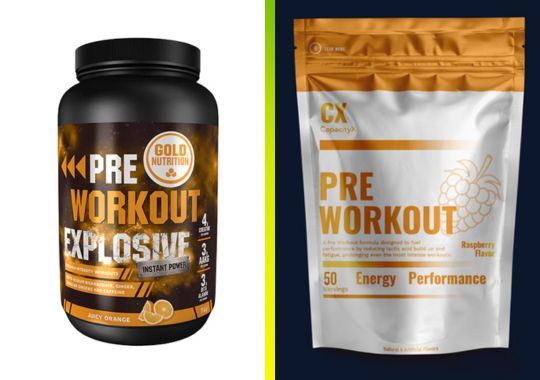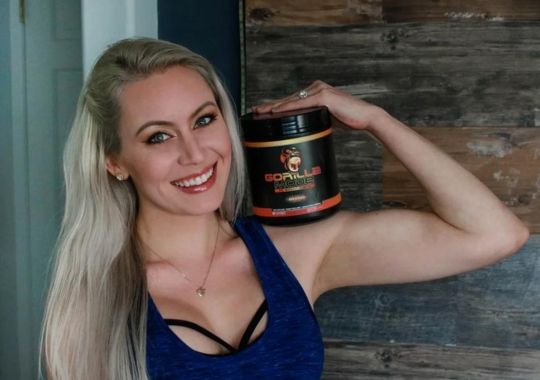Are you someone who loves to hit the gym or engage in intense workouts? If so, you may have come across the term "pre-workout" in your fitness journey. Pre-workout supplements have gained immense popularity among fitness enthusiasts for their ability to enhance energy, focus, and performance during workouts. In this article, we'll delve into the question, "How long does pre-workout last"?
As Amazon affiliates we may earn a commission if you purchase a product at no cost to you

Watch this interesting video.
How Long Does Pre-Workout Last?
Understanding the duration of pre-workout effects is crucial for planning your fitness routine and maximizing the benefits of your workout. The effects of pre-workout can be categorized into immediate effects, which include the onset and peak performance, and sustained effects, which refer to post-workout energy and focus. Let's delve into each of these aspects:
Immediate Effects: Onset and Peak Performance
The immediate effects of pre-workout typically kick in within 20 to 30 minutes after consumption. This timeframe may vary depending on factors such as individual metabolism, dosage, and specific ingredients. Upon ingestion, the active ingredients in pre-workout, such as caffeine and other stimulants, are rapidly absorbed into the bloodstream.
During the onset phase, you may experience a surge in energy, increased mental alertness, and improved focus. The stimulant components of pre-workout, like caffeine, work to activate the central nervous system and reduce perceived fatigue. This, in turn, can enhance your motivation, endurance, and overall performance during your workout session.
As you continue your exercise routine, pre-workout can help you reach your peak performance. The increased energy and focus allow you to push through intense workouts, lift heavier weights, and maintain a higher level of intensity for a more extended period. The peak performance effects of pre-workout usually last for about 1 to 2 hours after ingestion.
Sustained Effects: Post-Workout Energy and Focus
While the immediate effects of pre-workout provide an initial boost, some sustained effects can extend beyond your workout session. After your workout, you may still experience heightened energy levels and enhanced mental clarity for a certain duration.
The duration of these sustained effects can vary depending on factors such as individual metabolism, dosage, and specific ingredients. Generally, the post-workout energy and focus can last for an additional 2 to 4 hours after your exercise session. During this period, you may feel more alert, focused, and energized, allowing you to carry on with your daily activities or even engage in additional physical activities.
It's important to note that the duration of the sustained effects can be influenced by individual factors and the specific formulation of your pre-workout supplement. Non-stimulant pre-workouts or those with extended-release formulas may provide a longer duration of sustained effects compared to stimulant-based pre-workouts.
Understanding the duration of both immediate and sustained effects of pre-workout can help you plan your workouts and timing of supplement consumption more effectively. It's essential to listen to your body and assess your personal response to pre-workout to find the optimal timing that aligns with your fitness goals and lifestyle.

What is Pre-Workout and How Does It Work?
Pre-workout is a type of dietary supplement specifically formulated to enhance physical performance during workouts. It is typically taken before exercise to provide an extra boost of energy, focus, and endurance. Pre-workout supplements are designed to maximize the benefits of exercise by combining various ingredients that work together synergistically.
The primary goal of pre-workout is to improve athletic performance by increasing energy levels and reducing fatigue. One of the key ingredients commonly found in pre-workout supplements is caffeine. Caffeine is a stimulant that affects the central nervous system, promoting wakefulness and alertness. By blocking adenosine receptors in the brain, caffeine helps to reduce the perception of effort and fatigue during exercise, allowing individuals to push harder and train for longer durations.
Another important component of pre-workout supplements is creatine. Creatine is a naturally occurring compound found in the body, primarily in muscles. It plays a crucial role in the production of adenosine triphosphate (ATP), which is the primary energy source for muscle contractions. By supplementing with creatine, individuals can increase their intramuscular creatine stores, leading to improved strength, power, and overall exercise performance.
In addition to caffeine and creatine, pre-workout supplements often contain other ingredients like beta-alanine, citrulline malate, B-vitamins, and amino acids. Beta-alanine is an amino acid that helps to increase the production of carnosine in muscles. Carnosine acts as a buffer, reducing the buildup of lactic acid during intense exercise and delaying the onset of muscle fatigue. Citrulline malate, on the other hand, promotes increased blood flow and oxygen delivery to the muscles, enhancing endurance and reducing muscle soreness.
The combination of these ingredients in pre-workout supplements helps to enhance energy levels, increase focus, improve muscular strength and endurance, and delay the onset of fatigue. By taking pre-workout before a workout session, individuals can experience heightened mental alertness, improved physical performance, and a greater ability to push through challenging training sessions.
Factors Affecting the Duration of Pre-Workout Effects
The duration of pre-workout effects can vary from person to person and depends on several factors. Understanding these factors can help individuals make informed decisions about their pre-workout routine. Let's explore the key factors that influence the duration of pre-workout effects:
Dosage and Ingredients
The dosage and specific ingredients in your pre-workout supplement play a significant role in determining the duration of its effects. Different brands and formulations may contain varying concentrations of active compounds. Higher dosages or supplements with potent ingredients may result in longer-lasting effects, while lower dosages or milder formulations may have a shorter duration of action.
Individual Tolerance and Sensitivity
Each individual's body reacts differently to pre-workout supplements. Factors such as body weight, metabolism, caffeine sensitivity, and overall tolerance to stimulants can affect how long the effects of pre-workout last for an individual. Some people may experience prolonged effects, while others may notice a quicker onset and shorter duration.
Body Composition and Metabolism
Body composition and metabolism also play a role in the duration of pre-workout effects. Individuals with higher muscle mass and faster metabolic rates may experience a quicker onset of effects as the supplement is more readily distributed throughout their bodies. Conversely, those with lower muscle mass or slower metabolisms may experience a longer duration of effects as the supplement takes more time to be processed and eliminated from their systems.
Timing and Nutritional Considerations
The timing of pre-workout consumption and nutritional factors can impact the duration of its effects. Consuming pre-workout on an empty stomach may result in faster absorption and a quicker onset of effects. On the other hand, taking pre-workout with or after a meal can delay its absorption, potentially prolonging the duration of its effects.
Additionally, considering other nutritional factors, such as the presence of carbohydrates or protein in the pre-workout meal, can influence the duration of effects. Carbohydrates provide a readily available energy source, while protein supports muscle recovery and synthesis. By ensuring optimal nutrition before a workout, individuals can support the sustained effects of pre-workout and enhance their overall performance.

Duration Variations: Different Pre-Workout Products
Not all pre-workout supplements are created equal, and their specific formulations can impact the duration of their effects. Let's explore three variations of pre-workout products and how they can influence the duration of their effects:
Stimulant-Based Pre-Workouts
Stimulant-based pre-workouts are the most common type of pre-workout supplements. They contain ingredients like caffeine, guarana, or other stimulants that provide an immediate energy boost and enhance focus. These stimulants work by activating the central nervous system, increasing heart rate, and reducing perceived fatigue.
The duration of effects for stimulant-based pre-workouts typically ranges from 2 to 4 hours, depending on factors such as individual tolerance, dosage, and specific ingredients. Some individuals may experience a more prolonged duration of effects, while others may notice a shorter duration. It's essential to consider personal tolerance levels and avoid consuming stimulant-based pre-workouts too close to bedtime to prevent potential sleep disturbances.
Non-Stimulant Pre-Workouts
Non-stimulant pre-workouts are an alternative option for individuals who are sensitive to stimulants or prefer to avoid them altogether. These supplements focus on providing energy, endurance, and focus through ingredients other than caffeine or similar stimulants.
The duration of effects for non-stimulant pre-workouts can vary depending on the specific ingredients in the formulation. These supplements often contain compounds like creatine, beta-alanine, B-vitamins, and amino acids. The effects of non-stimulant pre-workouts may last for a similar duration as stimulant-based options, ranging from 2 to 4 hours.
Pre-Workouts with Extended-Release Formulas
Some pre-workout products are designed with extended-release formulas. These formulations aim to provide a sustained release of active ingredients over a more extended period, offering a prolonged duration of effects.
Pre-workouts with extended-release formulas typically utilize specialized encapsulation technology or time-release mechanisms to gradually release the ingredients into the body. As a result, the effects of these pre-workouts can last beyond the typical 2 to 4 hours associated with regular pre-workout supplements. The duration of effects for extended-release pre-workouts can range from 4 to 6 hours or more, depending on the specific formulation and individual factors.
It's important to note that the duration of effects can still vary among individuals, even with extended-release pre-workouts. Factors such as individual metabolism, body composition, and sensitivity to ingredients can influence how long the effects are experienced.
Managing Side Effects and Crash
While pre-workout supplements can provide numerous benefits, it's essential to be aware of potential side effects and how to manage them effectively. Additionally, some individuals may experience a post-workout crash, a sudden drop in energy levels after the effects of pre-workout wear off. Let's explore strategies for managing side effects and dealing with the post-workout crash:
Common Side Effects and How to Minimize Them
Common side effects of pre-workout supplements can include:
- Jitters and restlessness: Stimulant-based pre-workouts, especially those containing high amounts of caffeine, can sometimes cause jitters and restlessness. To minimize these effects, consider starting with a lower dosage and gradually increasing as tolerated. Additionally, ensure you consume your pre-workout well before your workout to allow for ample time for the initial surge of energy to stabilize.
- Increased heart rate and blood pressure: Stimulants in pre-workout supplements can elevate heart rate and blood pressure. If you have any underlying heart conditions or are sensitive to stimulants, it's crucial to consult with a healthcare professional before using pre-workout supplements. Monitoring your heart rate and blood pressure during and after exercise is also advisable.
- Digestive discomfort: Some individuals may experience digestive issues such as stomach discomfort, bloating, or diarrhea. To minimize these effects, consider adjusting the timing of your pre-workout intake to allow for digestion before exercise. Experiment with different food combinations or opting for non-stimulant pre-workouts may also help reduce digestive discomfort.
- Sleep disturbances: Pre-workout supplements containing stimulants like caffeine can interfere with sleep if consumed too close to bedtime. To prevent sleep disturbances, avoid taking pre-workout too late in the day. Consider opting for non-stimulant pre-workouts if sleep quality is a concern.
Dealing with Post-Workout Crash
A post-workout crash refers to a sudden drop in energy levels and mood that some individuals may experience as the effects of pre-workout wear off. To manage the post-workout crash effectively, consider the following strategies:
- Maintain a balanced diet: Ensure you consume a well-balanced meal or snack after your workout. Including a combination of carbohydrates, protein, and healthy fats can help replenish energy stores and support recovery.
- Stay hydrated: Dehydration can exacerbate feelings of fatigue and sluggishness. Drink plenty of water throughout the day, including after your workout, to maintain proper hydration levels.
- Consider natural energy boosters: If you experience a post-workout crash, natural energy boosters like a cup of green tea or a small serving of fruit can provide a gentle pick-me-up without the potential side effects of stimulants.
- Optimize sleep quality: Adequate sleep is essential for recovery and overall well-being. Prioritize a consistent sleep schedule and create a relaxing bedtime routine to ensure you get sufficient rest.
- Listen to your body: If you consistently experience a significant crash after using pre-workout supplements, it may be worth reassessing your routine. Consider adjusting the dosage, switching to a different formulation, or exploring alternative methods to enhance your workout performance.
Conclusion
Understanding the duration of pre-workout effects is essential for optimizing your fitness routine and getting the most out of your workouts. The immediate effects of pre-workout, including the onset and peak performance, typically last for about 1 to 2 hours after consumption. During this time, you experience increased energy, improved focus, and enhanced athletic performance.
Recommended Article

Frequently Asked Questions FAQs
What factors affect the duration of pre-workout effects?
Several factors influence the duration of pre-workout effects, including dosage and ingredients, individual tolerance and sensitivity, body composition and metabolism, and timing and nutritional considerations. These factors can vary among individuals, impacting how long pre-workout effects last.
How long do the immediate effects of pre-workout last?
The immediate effects of pre-workout typically kick in within 20 to 30 minutes after consumption and can last for about 1 to 2 hours. During this time, you may experience increased energy, improved focus, and peak performance during your workout session.
Are there different types of pre-workouts that vary in duration?
Yes, there are different types of pre-workouts that can vary in duration. Stimulant-based pre-workouts, non-stimulant pre-workouts, and pre-workouts with extended-release formulas have varying durations of effects. Stimulant-based pre-workouts generally last around 2 to 4 hours, while non-stimulant pre-workouts and those with extended-release formulas can provide a longer duration of effects, ranging from 4 to 6 hours or more.











